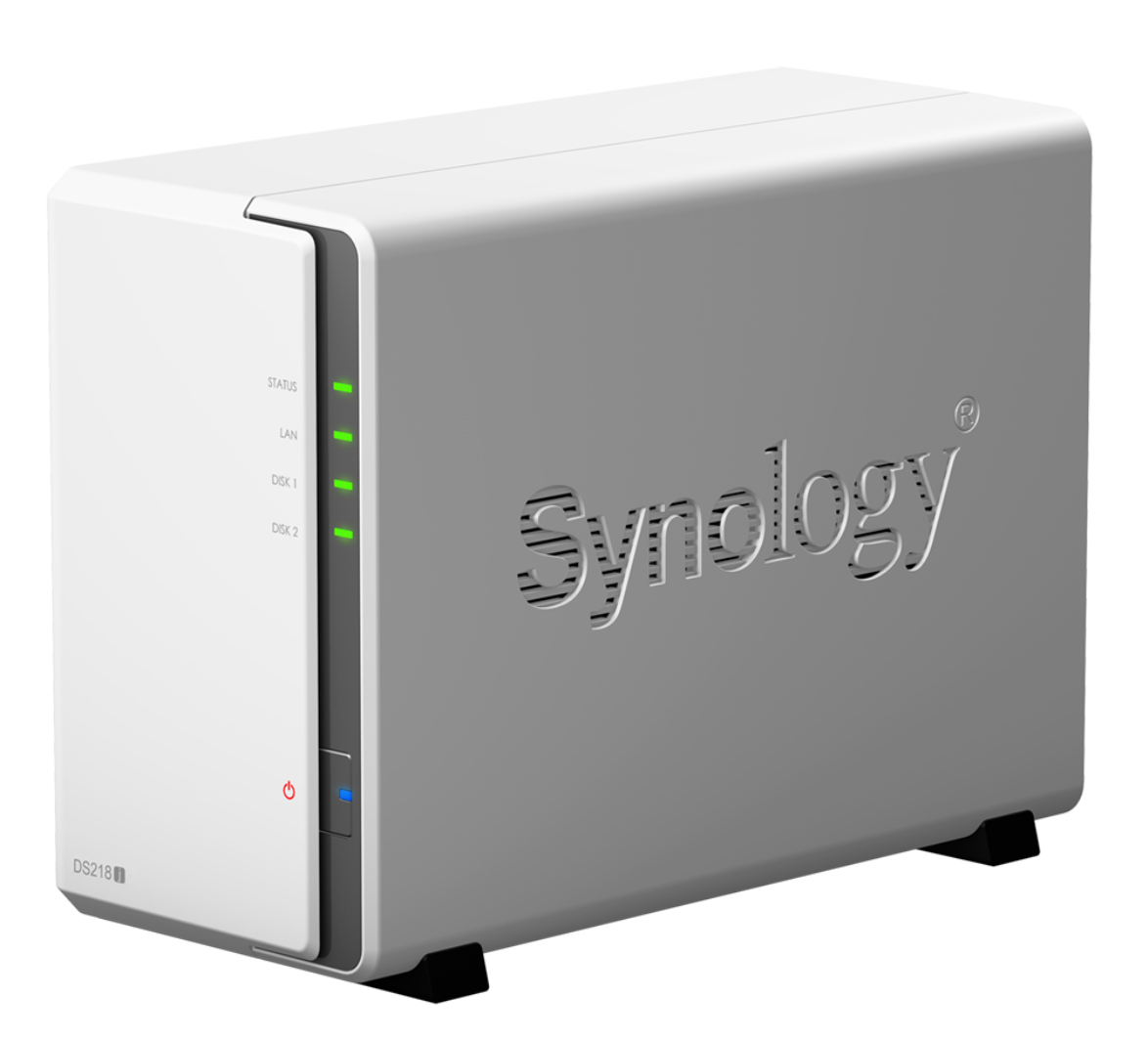Synology is a well known name when it comes to dependable storage solutions. The company has an extensive range of NAS drives on the market and we recently received the new DS218j for a test drive. The “j” suffix in the name denotes that the device is an entry level NAS meant for home and home office use.
However, after using the Synology DS218j for almost two weeks now, I can honestly say that the drive is capable of even handling day to day storage and data access chores at a small business setup. The DS218j is a two-bay NAS that is anything but “entry-level”.
 On the outside Synology’s new DS218j isn’t much different from its predecessor, the DS216j. It is easy to mistake this one for the older model. This unit can take up to two drives with a storage capacity of 8TB each. In terms of connectivity, you get one gigabit Ethernet port and two standard USB 3.0 ports at the rear of the unit.
On the outside Synology’s new DS218j isn’t much different from its predecessor, the DS216j. It is easy to mistake this one for the older model. This unit can take up to two drives with a storage capacity of 8TB each. In terms of connectivity, you get one gigabit Ethernet port and two standard USB 3.0 ports at the rear of the unit.
When it comes to specs, you see the difference between the DS218j and its predecessor, the DS216j. While the DS216j used to run on a dual-core Marvell ARMADA 385 (88F6820) with a clock speed of 1-GHz, the new DS218j has a 1.3GHz CPU of the same Marvell design. The DDR3 memory though remains unchanged at 512MB.
 You get room for two 3.5-inch hard disks out of the box. It’s possible to fit 2.5-inch hard disks and SSDs, but only with an adapter – it requires the Type-C model. We configured the NAS with the default Synology Hybrid Raid (SHR). This allows the device to tolerate the failure of one hard disk without any data loss, but at the expense of one disk’s capacity.
You get room for two 3.5-inch hard disks out of the box. It’s possible to fit 2.5-inch hard disks and SSDs, but only with an adapter – it requires the Type-C model. We configured the NAS with the default Synology Hybrid Raid (SHR). This allows the device to tolerate the failure of one hard disk without any data loss, but at the expense of one disk’s capacity.
Setting up the NAS is a walk in the park. Once you connect the NAS to your router and power it up, you need to go to find.synology.com. Doing this will locate the NAS on your network. If you’re using brand-new hard disks, you’ll just be able to click the big Download button to grab the latest version of Synology’s DSM operating system.
 If you’ve used your disks before in another NAS for instance, you will need to plug them directly into your PC and use Disk Management to erase any partitions. This needs to be done in order to start using the hard disks with the new NAS drive.
If you’ve used your disks before in another NAS for instance, you will need to plug them directly into your PC and use Disk Management to erase any partitions. This needs to be done in order to start using the hard disks with the new NAS drive.
There are many NAS drives available on the market. But in my experience not a single one comes close to the clean and neat looking Synology DSM interface. It is quite brilliant that you can operate your NAS as if it were a desktop computer, right through your web browser.
 Synology also makes it easier for you to access your NAS interface and files from anywhere, using the QuickConnect ID you create during setup. Just by typing quickconnect.to/ followed by your own QuickConnect ID into any web browser, you will be able to access your NAS’ interface.
Synology also makes it easier for you to access your NAS interface and files from anywhere, using the QuickConnect ID you create during setup. Just by typing quickconnect.to/ followed by your own QuickConnect ID into any web browser, you will be able to access your NAS’ interface.
Synology also offers a very good app ecosystem through its Package Center. There are 96 applications in total, from both Synology and third-party developers. They cover anything from media servers to content management systems to e-commerce.
 While there are lots of apps to cover in one single review, I will speak about a couple of them. The Cloud Station, Audio Station, Photo Station and the Video Station are some brilliant apps. Cloud Station Drive turns your NAS into a personal version of Dropbox. You assign a folder on your computer that you wish to sync with the NAS, and you can also choose to sync this folder with any other computers running the software.
While there are lots of apps to cover in one single review, I will speak about a couple of them. The Cloud Station, Audio Station, Photo Station and the Video Station are some brilliant apps. Cloud Station Drive turns your NAS into a personal version of Dropbox. You assign a folder on your computer that you wish to sync with the NAS, and you can also choose to sync this folder with any other computers running the software.
Audio Station gives you a web interface for your music collection, and also works with the DS Audio mobile app. Photo Station as the name suggests is a image repository on your personal cloud. The Video Station, meanwhile, is a stripped down version of Plex.
Synology also offers apps for iOS and Android devices such as the Synology Moments app. This app allows you to view photos/videos stored in Synology Drive with an Anrdroid or iOS device on the go. All your photos will be displayed in time order and get sorted into topical albums.
In order to gauge the performance of the NAS, there are two things to look for: usability and throughput. In terms of real world performance, the throughput we achieved was 119MB/s for reads and 121 MB/s for writes, using CrystalDiskMark 5.2.2 benchmark.
So the question is, should you buy the Synology DS218j? If you are looking for a NAS drive that can serve as a personal cloud, offer a brilliant ecosystem of apps, is priced right, has a beautiful interface and offers awesome performance, you should definitely buy it!
Price: $177 (AED 650 approx.)






